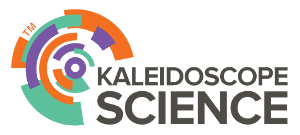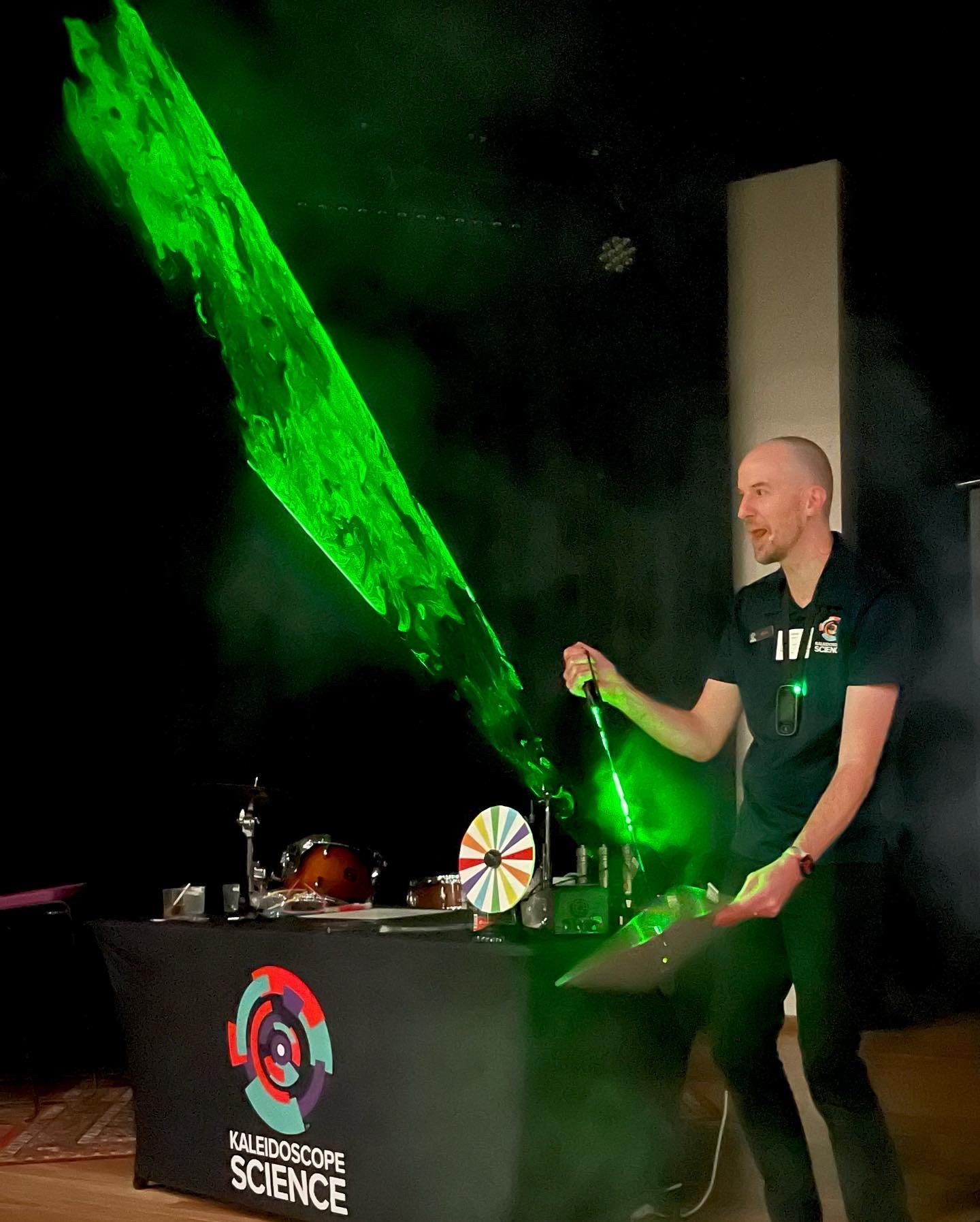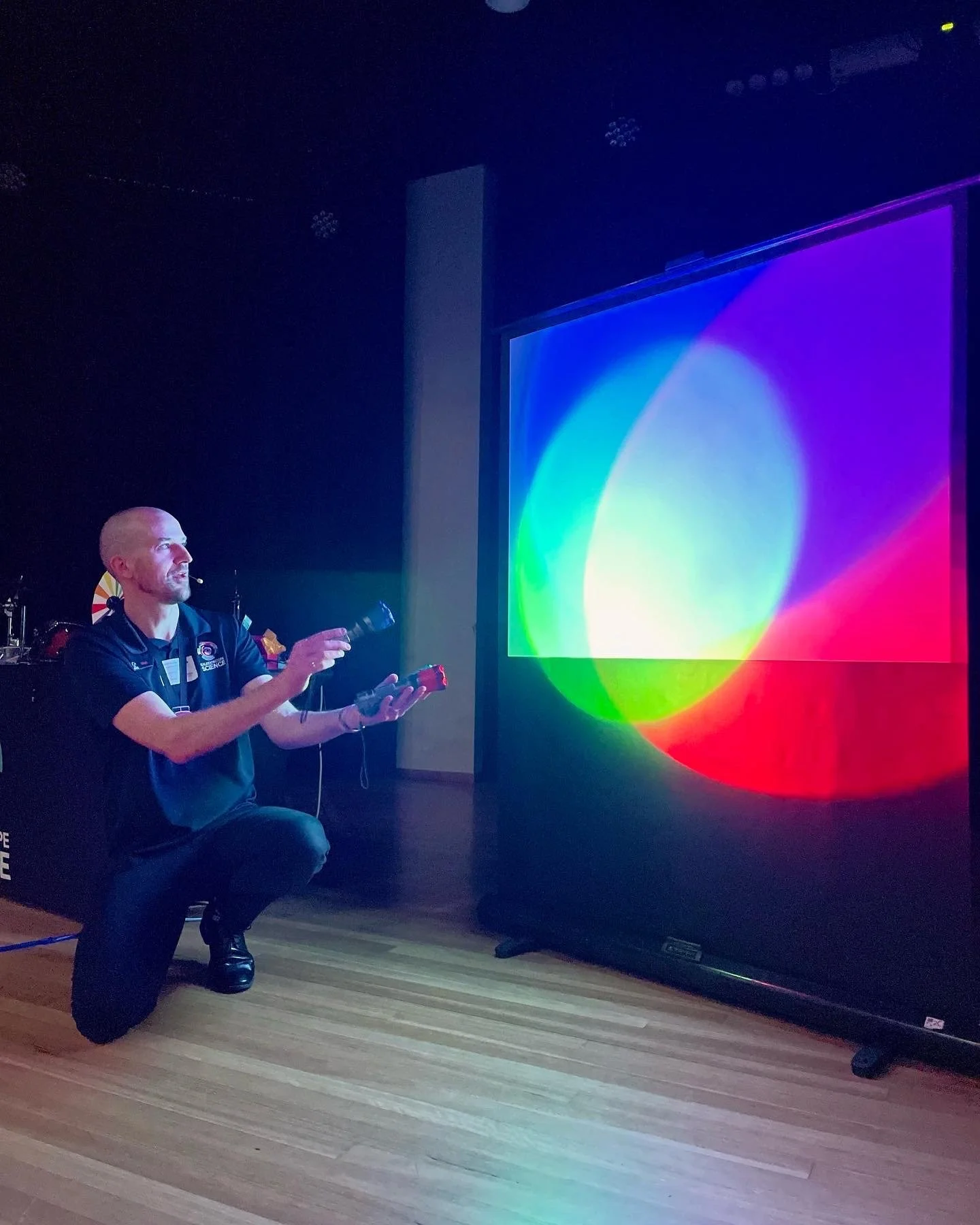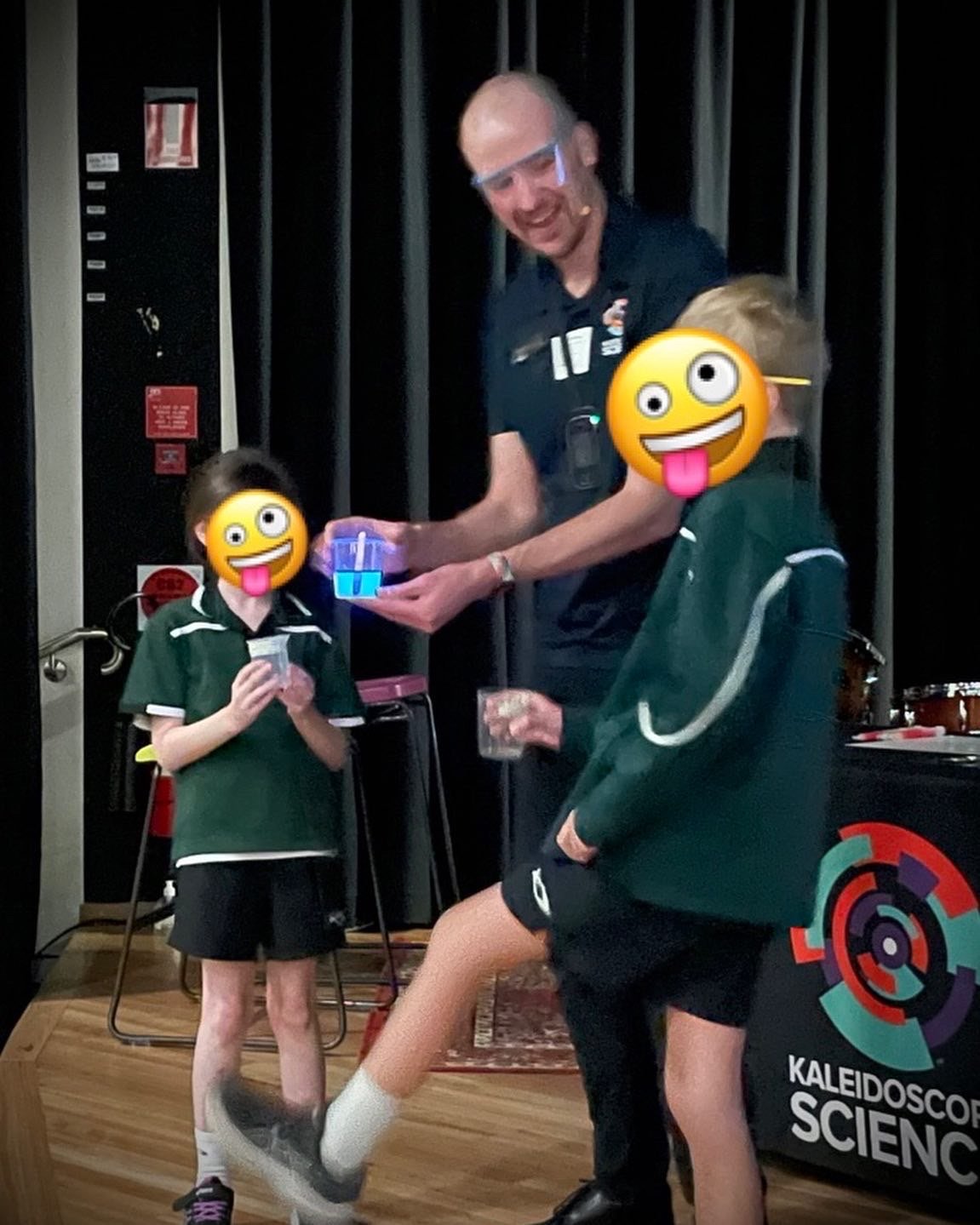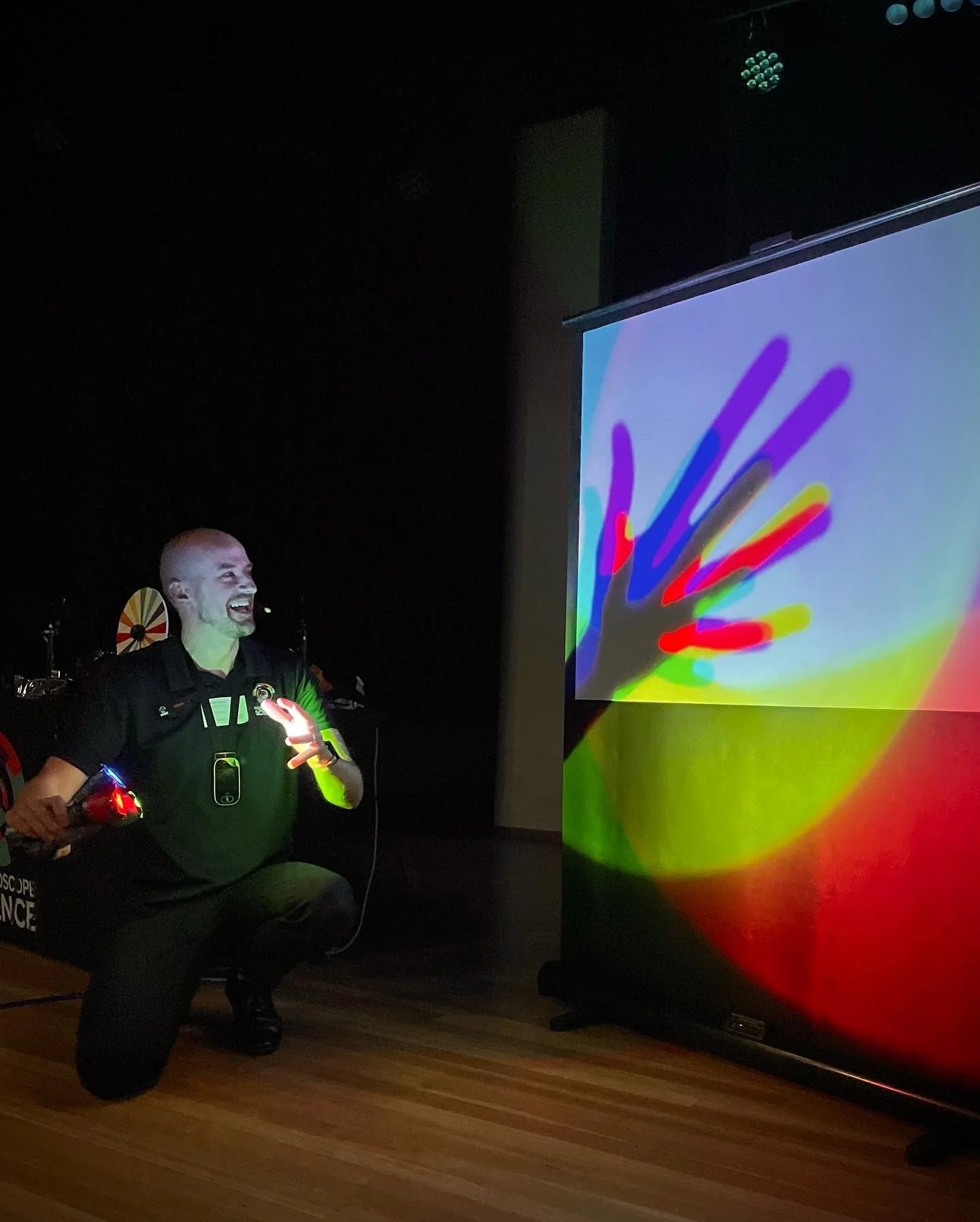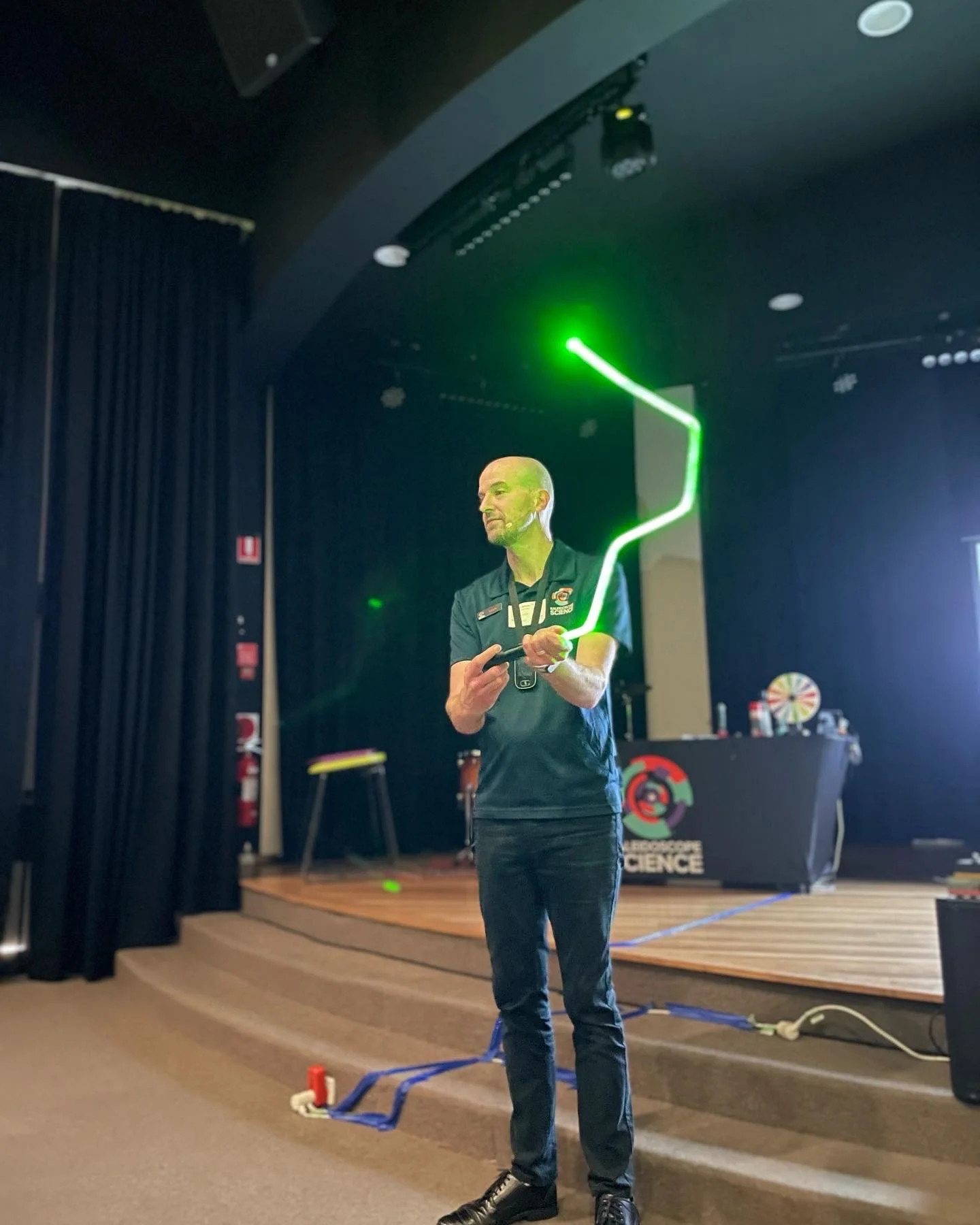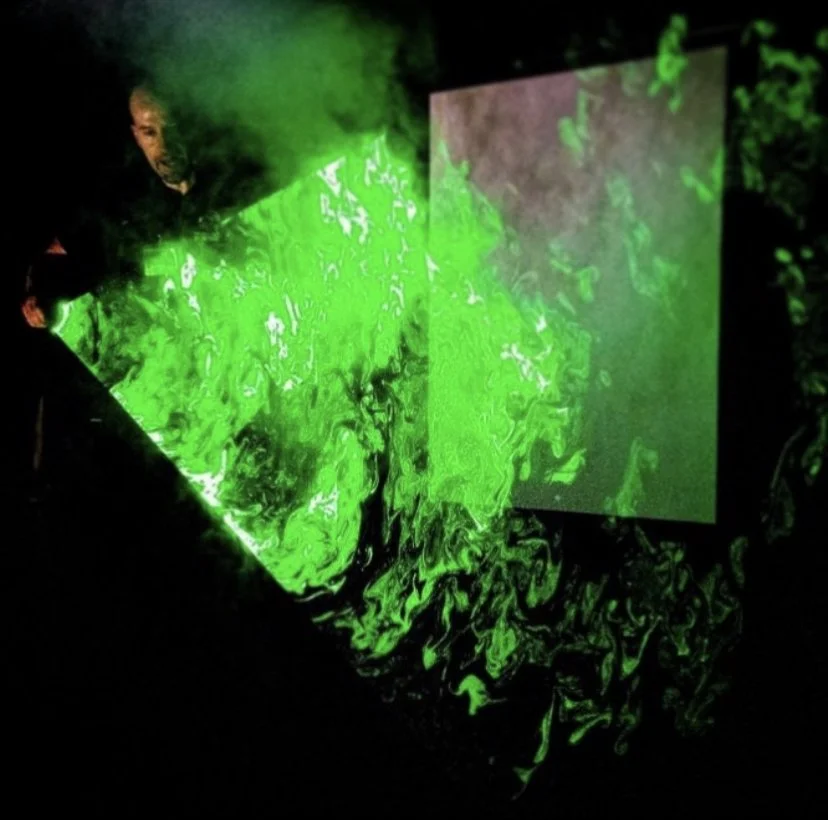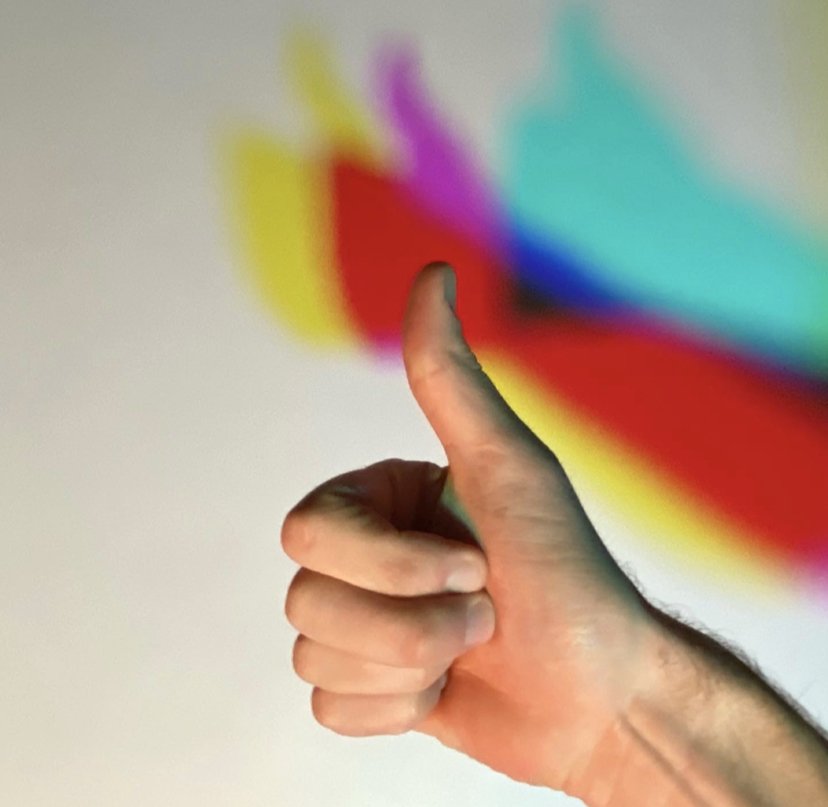The Light Show: Colours, Reflections & Lenses
Primary School Incursion (K-6)
We need it to see, communicate, grow food and even to explore the universe. So what is light, where does it come from and how does it work? This show tells the story of light through our selection of highly colourful and spectacular demonstrations. We'll cover how light is made, how it moves, what happens when it meets an object and how we see it - including some fun optical illusions.
-
Making light in different ways - glowing chemical reactions, heat & electricity
Watching light as it moves using a laser
Bending light with optic fibres
Making photographs with glow-in-the-dark paper
Projecting images with DIY lenses
Making reflections
Testing opaque, translucent, transparent and reflective surfaces
Colours and colour mixing
Making rainbows and Newton's discovery
Optical illusions
*Demonstrations performed will be customised to suit the audience age and may depend on venue or time constraints.
-
$735 per show (incl. GST)
-
Sydney, Central Coast & Newcastle
-
Up to 150 students per show
-
Years K-6
-
Set up: 30-60 minutes
Show: 60 minutes
Pack up: 30-60 minutes
-
Darkened, indoor venue with power outlet & space for students to sit
Accessible off-street parking for the duration of our visit, allowing for a 1-hour set up and pack up time
(optional) 1x trestle table, if available
-
This show features an optional demonstration which uses a strobe light. These kinds of lights may affect people with light-sensitive epilepsy. We will consult with teachers before each show but also request that you kindly inform us at your earliest convenience if there may be any people with light-sensitive epilepsy in attendance.
-
Light Shows (Year 5)
Look! Listen! (Year 1)
-
SCIENCE UNDERSTANDING
Foundation:
Living things have basic needs, including food and water (ACSSU002)
Objects are made of materials that have observable properties (ACSSU003)
Daily and seasonal changes in our environment, including the weather, affect everyday life (ACSSU004)
Year 1:
Light and sound are produced by a range of sources and can be sensed (ACSSU020)
Everyday materials can be physically changed in a variety of ways (ACSSU018)
Observable changes occur in the sky and landscape (ACSSU019)
Year 2:
Different materials can be combined for a particular purpose (ACSSU031)
Earth’s resources, including water, are used in a variety of ways (ACSSU032)
Year 4:
Natural and processed materials have a range of physical properties; These properties can influence their use (ACSSU074)
Year 5:
Light from a source forms shadows and can be absorbed, reflected and refracted (ACSSU080)
Year 6:
The growth and survival of living things are affected by the physical conditions of their environment (ACSSU094)
SCIENCE AS A HUMAN ENDEAVOUR
Foundation:
Science involves exploring and observing the world using the senses (ACSHE013)
Year 1:
Science involves asking questions about, and describing changes in, objects and events (ACSHE021)
People use science in their daily lives (ACSHE022)
Year 2:
Science involves asking questions about, and describing changes in, objects and events (ACSHE034)
People use science in their daily lives (ACSHE035)
Year 3:
Science involves making predictions and describing patterns and relationships (ACSHE050)
Science knowledge helps people to understand the effect of their actions (ACSHE051)
Year 4:
Science involves making predictions and describing patterns and relationships (ACSHE061)
Science knowledge helps people to understand the effect of their actions (ACSHE062)
Year 5:
Science involves testing predictions by gathering data and using evidence to develop explanations of events and phenomena (ACSHE081)
Important contributions to the advancement of science have been made by people from a range of cultures (ACSHE082)
Scientific understandings, discoveries and inventions are used to solve problems that directly affect peoples’ lives (ACSHE083)
Scientific knowledge is used to inform personal and community decisions (ACSHE217)
Year 6:
Science involves testing predictions by gathering data and using evidence to develop explanations of events and phenomena (ACSHE098)
Important contributions to the advancement of science have been made by people from a range of cultures (ACSHE099)
Scientific understandings, discoveries and inventions are used to solve problems that directly affect peoples’ lives (ACSHE100)
Scientific knowledge is used to inform personal and community decisions (ACSHE220)
SCIENCE INQUIRY SKILLS
Foundation:
Respond to questions about familiar objects and events (ACSIS014)
Explore and make observations by using the senses (ACSIS011)
Engage in discussions about observations (ACSIS233)
Share observations and ideas (ACSIS012)
Year 1:
Respond to and pose questions, and make predictions about familiar objects and events (ACSIS024)
Participate in guided investigations to explore and answer questions, such as manipulating materials and testing ideas (ACSIS025)
Use informal measurements in the collection and recording of observations (ACSIS026)
Through discussion, compare observations with predictions (ACSIS212)
Year 2:
Respond to and pose questions, and make predictions about familiar objects and events (ACSIS037)
Participate in guided investigations to explore and answer questions, such as manipulating materials and testing ideas (ACSIS038)
Use informal measurements in the collection and recording of observations (ACSIS039)
Through discussion, compare observations with predictions (ACSIS214)
Year 3:
With guidance, identify questions in familiar contexts that can be investigated scientifically and predict what might happen based on prior knowledge (ACSIS053)
Suggest ways to plan and conduct investigations to find answers to questions (ACSIS054)
Safely use appropriate materials, tools or equipment to make and record observations, using formal measurements and digital technologies as appropriate (ACSIS055)
Compare results with predictions, suggesting possible reasons for findings (ACSIS215)
Reflect on the investigation, including whether a test was fair or not (ACSIS058)
Year 4:
With guidance, identify questions in familiar contexts that can be investigated scientifically and predict what might happen based on prior knowledge (ACSIS064)
Suggest ways to plan and conduct investigations to find answers to questions (ACSIS065)
Safely use appropriate materials, tools or equipment to make and record observations, using formal measurements and digital technologies as appropriate (ACSIS066)
Compare results with predictions, suggesting possible reasons for findings (ACSIS216)
Reflect on the investigation; including whether a test was fair or not (ACSIS069)
Year 5:
With guidance, pose questions to clarify practical problems or inform a scientific investigation, and predict what the findings of an investigation might be (ACSIS231)
With guidance, plan appropriate investigation methods to answer questions or solve problems (ACSIS086)
Decide which variable should be changed and measured in fair tests and accurately observe, measure and record data, using digital technologies as appropriate (ACSIS087)
Use equipment and materials safely, identifying potential risks (ACSIS088)
Compare data with predictions and use as evidence in developing explanations (ACSIS218)
Suggest improvements to the methods used to investigate a question or solve a problem (ACSIS091)
Year 6:
With guidance, pose questions to clarify practical problems or inform a scientific investigation, and predict what the findings of an investigation might be (ACSIS232)
With guidance, plan appropriate investigation methods to answer questions or solve problems (ACSIS103)
Decide which variable should be changed and measured in fair tests and accurately observe, measure and record data, using digital technologies as appropriate (ACSIS104)
Use equipment and materials safely, identifying potential risks (ACSIS105)
Compare data with predictions and use as evidence in developing explanations (ACSIS221)
Suggest improvements to the methods used to investigate a question or solve a problem (ACSIS108)
Photos:
Latest REVIEWS:
FROM FACEBOOK:
①
Book us
②
Book a space
in your school
③
We do the rest!
We come to you - no buses ✓
Fully insured & risk assessments available ✓
Teachers only required for supervision ✓
Aligned with the Australian Curriculum standards ✓
“Understanding is joyous”
Banner image: "Glowsticks ball" by Eirik Solheim. Licensed under Creative Commons Attribution-Share Alike 2.0
Additional photography: Phil Swaisland
